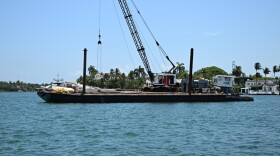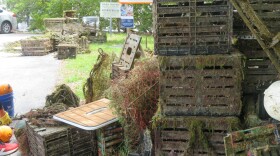-
Miami-Dade sparked a fight with the the Biscayne Nature Center — housed in a building that Douglas helped raise money to construct — in August after saying its programming license was expiring this month.
-
With an explosion of youth sailing programs around Coconut Grove, a generation of youth sailors is making its mark on the world stage.
-
The nonprofit center that Marjory Stoneman Douglas helped found says its located a decades-old document that could boost its case to stay.
-
The lawsuit accuses Waterfront Construction — the company that owns the barge — and the Miami Yacht Club and MYC Youth Sailing Foundation of negligence and recklessness leading up to the July 28 crash.
-
A lawyer for the family of Calena Gruber, who survived a deadly crash last Monday aboard a sailboat crash with a barge in Biscayne Bay, says the family is weighing a potential lawsuit.
-
“It is with heavy hearts that Coast Guard investigators announce the passing of the 10-year-old child that was in critical condition at Jackson Memorial Hospital,” said U.S. Coast Guard officials in a statement on Sunday.
-
The two young girls were killed Monday morning when a barge collided with a sailboat carrying a group of children during a sailing summer camp on Biscayne Bay near Hibiscus Island, the U.S. Coast Guard reported Monday night.
-
Two people died Monday after a barge struck a sailboat off Miami Beach, throwing children overboard who had to be rescued from the water, authorities said.
-
A dozen boat teams and even more shoreline volunteers participated in the latest Derelict Trap Rodeo, part of Friends of Biscayne Bay's efforts to restore the bay. WLRN rode along with one team as they removed abandoned crab and lobster traps that continue to trap and harm marine life long after they’re left behind.
-
The most recent Biscayne Bay Water Quality Report Card revealed that a part of the bay actually declined in quality. Experts, however, seem more hopeful that plans and efforts for the bay are heading in the right direction.
-
In its latest draft work schedule, finishing the massive Everglades reservoir would be pushed back four years to 2034, while work to move water south has also fallen behind. Asking Congress to approve Biscayne Bay projects would be delayed another two years.
-
Miami-Dade officials released the 2024 Biscayne Bay Report Card. The results of which showed almost no change in the overall health of the Bay, which was already not in the best state.
Play Live Radio
Next Up:
0:00
0:00
Available On Air Stations








